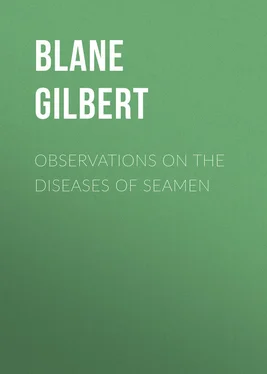Gilbert Blane - Observations on the Diseases of Seamen
Здесь есть возможность читать онлайн «Gilbert Blane - Observations on the Diseases of Seamen» — ознакомительный отрывок электронной книги совершенно бесплатно, а после прочтения отрывка купить полную версию. В некоторых случаях можно слушать аудио, скачать через торрент в формате fb2 и присутствует краткое содержание. Жанр: foreign_antique, foreign_prose, на английском языке. Описание произведения, (предисловие) а так же отзывы посетителей доступны на портале библиотеки ЛибКат.
- Название:Observations on the Diseases of Seamen
- Автор:
- Жанр:
- Год:неизвестен
- ISBN:нет данных
- Рейтинг книги:3 / 5. Голосов: 1
-
Избранное:Добавить в избранное
- Отзывы:
-
Ваша оценка:
- 60
- 1
- 2
- 3
- 4
- 5
Observations on the Diseases of Seamen: краткое содержание, описание и аннотация
Предлагаем к чтению аннотацию, описание, краткое содержание или предисловие (зависит от того, что написал сам автор книги «Observations on the Diseases of Seamen»). Если вы не нашли необходимую информацию о книге — напишите в комментариях, мы постараемся отыскать её.
Observations on the Diseases of Seamen — читать онлайн ознакомительный отрывок
Ниже представлен текст книги, разбитый по страницам. Система сохранения места последней прочитанной страницы, позволяет с удобством читать онлайн бесплатно книгу «Observations on the Diseases of Seamen», без необходимости каждый раз заново искать на чём Вы остановились. Поставьте закладку, и сможете в любой момент перейти на страницу, на которой закончили чтение.
Интервал:
Закладка:
The squadron that came from England under Lord Hood, suffered, upon the whole, much less from acute diseases, during the first months of their service in this climate, than the ships that arrived with Lord Rodney, which was probably owing, in part at least, to the former having arrived at the driest and coolest season of the year. The Barfleur, however, had a large proportion of all the three prevailing diseases; and large ships are in general more subject to them than those of a smaller rate. But of all the ships in the fleet, the Alfred had the greatest proportion of the three sea epidemics. The Prince William suffered more than any other ship in the fleet from the flux, and the Princessa from the scurvy. In some instances, reasons can be assigned for the prevalence of particular diseases in particular ships, such as accidental infection, or the manner in which they have been victualled, manned, or disciplined; but in many cases the cause is so subtile or obscure as to elude our inquiry.
The most healthy of the new squadron, during this campaign, were the Belliqueux and Panther; the former was a new ship, and came from England with a very irregular and ill-disciplined crew. Soon after arriving in the climate, she was threatened with a dysentery, which, though it spread a good deal, did not prove severe nor mortal; but being left at St. Eustatius on this account, while the rest of the fleet was cruising, she soon became very healthy, and remained so. This is the second instance we have had occasion to remark of a new ship being healthy.
The Panther preserved her health by being on small separate cruises, and frequently in port, not being attached to the main squadron. The Sandwich was the only other ship not engaged in the long cruise.
Of the ships lately from England, that were employed in this cruise, the Gibraltar seems to have been the least sickly. This ship left England healthy; but having received a draft of dirty men when upon the eve of sailing, a fever of the infectious kind broke out on the passage, so that she arrived in the West Indies in a sickly state. This fever disappeared very soon after; and it is proved by this, as well as other facts, that a warm climate, so far from tending to generate, or even to foster the infection of fever, tends rather to extinguish it. The Gibraltar had been put under excellent discipline by her former commander, while in the Channel service; and this being afterwards kept up, the men were always clean and regular. This was the Spanish Admiral’s ship, taken by the fleet under the command of Lord Rodney off Cape St. Vincent’s, in January 1780. She was then called the Phœnix, and was of a singular excellence both with respect to materials and construction. Whether the cedar, of which a great part of her timbers consisted, contributed to the healthiness, by its balsamic effluvia, I will not pretend to determine.
The Invincible was also uncommonly healthy during this cruise, which may likewise be ascribed to good discipline, and to her having been more than three years in commission before sailing from England, whereby the men were brought into order, and accustomed to each other and to a sea life. This ship was almost singular in having no acute diseases for several months after arriving from Europe; but at length paid the tribute to the climate in May and June, as may be seen in the Table.
From the account of the three frigates at the bottom of the list in the Table, it appears how much more healthy they are than ships of the line. The total complements of the three is exactly equal to that of one seventy-four-gun ship; but their whole sickness and mortality is less than that of any one ship of the line of that class, although the Triton was uncommonly sickly for a frigate.
There seem to be several causes for the superior degree of health usually enjoyed by this smaller class of ships. There is less chance of mixtures of men in frigates, as their complement is smaller, and it is more easy for the captain and officers to keep an eye over a few men than a great number; for, in a great ship, there are generally men, who, concealing themselves in the most retired parts, no one takes cognizance of them, and they destroy themselves, and infect others, by their laziness and filth. In the next place, there is a greater proportion of volunteers and real seamen in frigates, and more landmen and pressed men in ships of the line, the former being more in request, on account of the greater chance of prize money. Lastly, a small ship is more easily ventilated, and the mass of foul air issuing from the hold, from the victuals, water, and other stores, as well as the effluvia exhaling from the men’s bodies, is less than in a large ship.
Many other and more minute remarks might be made on different ships in this season of hard service; but to do this would be tedious, and the inspection of the Tables may suggest observations to the reader. There is a striking and instructive fact, however, with regard to two ships, which I cannot help relating. The Alcide and Invincible, both of seventy-four guns, in working to windward, after the action with the French fleet, on the 29th of April, anchored at Montserrat on the 11th of May, in order to water. They remained there only part of two days, and they procured no refreshment, except a few bushels of limes. The scurvy then prevailed to a great degree in both ships; but between this time and the 23d of May, when they came to an anchor at Barbadoes, sixty men, who had been confined with this disease, were discharged, as fit for duty, from the sick list of the Invincible, and a hundred and fourteen from that of the Alcide. These were the only two ships that had the advantage of the limes; and during these twelve remaining days of the voyage the scurvy continued to increase in all the other ships. Dr. Lind is the first author who gives a decided preference to lemons, limes, and oranges, over every other antiscorbutic; and the above-mentioned fact proves as demonstrably as possible the infinite advantage of this species of acid in scurvy.
The fleet was supplied with essence of malt during all this campaign; and though it was, no doubt, of service, it was far from having that powerful and manifest effect that the acid fruits had, and certainly did by no means prevent the scurvy in all cases. I have strong testimonies, however, of its beneficial effects from the surgeons of several of the ships, particularly of the Gibraltar, Centaur, Torbay, and Alcide, in all of which it was found either to cure the scurvy in its first beginning, to retard its progress, or to mend the appearance of scorbutic ulcers, and dispose them to heal.
I had conceived that melasses, being a vegetable sweet, must have been a very powerful antiscorbutic; but the greatest part of the last reinforcement of seven ships came from England furnished with this as an article of victualling, as a substitute for a certain proportion of oatmeal, which was withheld agreeably to a late very judicious order of the Admiralty. But though I am persuaded that this article of diet mitigated the disease, it was very far from preventing it; and the Princessa in particular, which suffered most from the scurvy, was well supplied with it.
There is reason to think that it is not in the vegetable sweet alone that the antiscorbutic principle resides, but in this in conjunction with the natural mucilage, such as exists in the malt. I suspect likewise that the change which the essence undergoes in its preparation tends also to rob it of some of its original virtue. But the melasses are still farther altered by being deprived of the natural mucilage by means of quick lime, with which all sugar is clarified in the boilers. Dr. Hendy, of Barbadoes, to whom I have been obliged for several remarks, informed me, that the liquor, before it undergoes this operation, has been found by him to produce the most salutary effects in the scurvy; but as this cannot be had at sea, we had no opportunity of comparing it with other antiscorbutics. It is certain also that the medical effects of the native sweet juices are, in other respects, very different from what they are in their refined state; for manna, wort, and the native juice of the sugar cane, are purgative; whereas sugar itself is not at all so 5. This affords a presumption, that they may be also different in their antiscorbutic quality; and there is reason to think, from experience, that the more natural the state in which any vegetable is, the greater is its antiscorbutic quality. Vegetables, in the form of sallads, are more powerful than when prepared by fire; and I know, for certain, that the rob of lemons and oranges is not to be compared to the fresh fruit. Raw potatoes have been used with advantage in the fleet, particularly by Mr. Smith, of the Triton, who made the scorbutic men eat them, sliced with vinegar, with great benefit. This accords also with what Dr. Mertans, of Vienna, has lately communicated to the Royal Society of London.
Читать дальшеИнтервал:
Закладка:
Похожие книги на «Observations on the Diseases of Seamen»
Представляем Вашему вниманию похожие книги на «Observations on the Diseases of Seamen» списком для выбора. Мы отобрали схожую по названию и смыслу литературу в надежде предоставить читателям больше вариантов отыскать новые, интересные, ещё непрочитанные произведения.
Обсуждение, отзывы о книге «Observations on the Diseases of Seamen» и просто собственные мнения читателей. Оставьте ваши комментарии, напишите, что Вы думаете о произведении, его смысле или главных героях. Укажите что конкретно понравилось, а что нет, и почему Вы так считаете.












